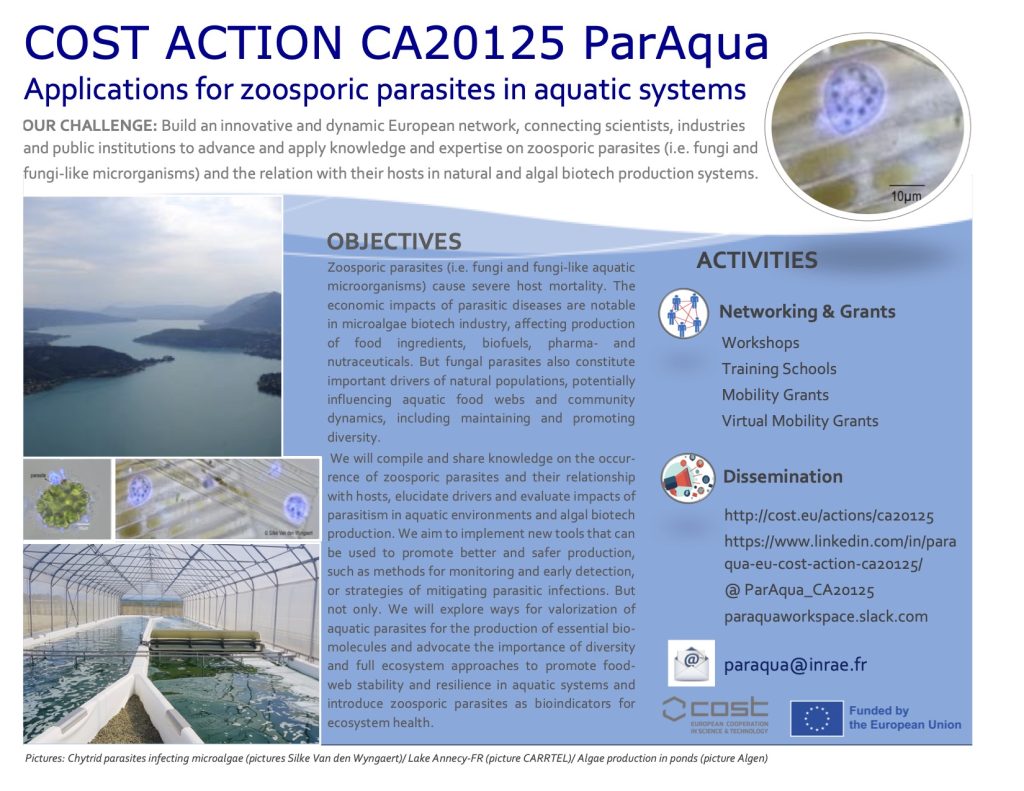Description of the Action
The main aim and objective of the Action are to organize and coordinate an innovative and dynamic Network, connecting academia, industries and water management authorities to advance and apply knowledge and expertise on zoosporic parasites (i.e. aquatic fungi and fungi-like microorganisms) and the relation with their hosts in natural ecosystems and industrial algal biotech production.
Zoosporic parasites cause severe host mortality of aquatic organisms. The economic impacts of parasitic diseases are notable in the microalgae biotech industry, affecting the production of food ingredients, biofuels, pharma- and nutraceuticals. But zoosporic parasites also constitute important drivers of natural populations, potentially influencing aquatic food webs and community dynamics, including maintaining and promoting diversity.
We will compile and share knowledge on the occurrence of zoosporic parasites and their relationship with hosts, elucidate drivers and evaluate the impacts of parasitism in aquatic environments and algal biotech production. We aim to implement new tools that can be used to promote better and safer algal production, such as methods for monitoring and early detection, or strategies for mitigating parasitic infections. But not only. We will explore ways for the valorization of aquatic parasites for the production of essential bio-molecules and advocate the importance of diversity and full ecosystem approaches to promote food-web stability and resilience in aquatic systems and introduce zoosporic parasites as bioindicators of ecosystem health.
Objectives
Research Coordination
- Compile and integrate a database on zoosporic parasites across Europe and inventorise parasite effects on algal hosts in algal biotech and natural systems.
- List and integrate information on environmental drivers of parasite epidemic development - and contrast with the role of host abundance in setting up infections.
- Build a knowledge hub, which will first identify the most pressing knowledge gaps and needs and act as a catalyst for innovation in finding and implementing practical solutions to overcome economic losses in algal biotech systems.
- Collect, assess and organise early detection methods through DNA testing and real time automated monitoring systems.
- Design specific monitoring campaigns to follow parasites and their hosts in algal biotech as well as natural systems.
- Develop specific protocols for monitoring and control strategies for disease prevention, weighing their feasibility and (cost-)effectiveness. Develop scripts for models to predict production losses and allow for early warning alerts.
- Jointly elaborate a Decision Support Tool that guides users to achieve the best possible solutions to prevent or contain infections in algal biotech systems at the earliest possible stage, minimising production losses and maximising enterprise profits.
- Encourage submission of zoosporic parasites in European culture collections to strengthen their presence and ensure long-term preservation for the benefit of fundamental and applied research on these parasites.
- Coordinate efforts between academia, industry and lake managers, to explore the potential of considering naturally occurring parasites as metrics for novel monitoring strategy in lakes and reservoirs.
- By using the knowledge acquired during in the Action, expand our expertise on the occurrence of zoosporic parasites under a changing climate. Advocate the importance of maintaining healthy aquatic ecosystems by supporting biodiversity and emphasising the importance of overlooked biotic interactions (such as parasitism) in guaranteeing ecosystem functional processes.
Capacity Building
- Establish an active network of representatives from academic research, biotech and water management, each sector brings their own experience and expertise. To build up from the existing network and reach strong representation across Europe, including most of the COST Countries.
- Stimulate innovative solutions in algal biotech and lake management for the losses incurred through parasite infections. Ideally create new or enhanced business opportunities for European SMEs in these sectors.
- Actively promote and guard diversity in terms of geographic origin, gender and career stage in all of the Action's activities.
- Actively create opportunities for Early Career Investigators (ECI) in leading the Action, e.g. through leadership roles in Working and Project Groups. Provide opportunities for ECIs to broaden and deepen their skills through Training Schools (TS) and Short Term Scientific Missions (STSM).
- Equally provide opportunities for scientists and professionals from biotech and water management. Organize reciprocal - academia vs industry - STSM, with a particular focus on appointing ITC as host, so that they can disseminate knowledge in their respective countries.
- Set-up and maintain an active communication strategy, through the use of various social media, press- releases or public presentations to raise public awareness about the topics of interest in ParAqua.
- Aiming for the long-term maintenance of the ParAqua network after finishing the Action. Reach out and seek connection with existing relevant networks like European Algae Biomass Association, EABA, https://www.eaba-association.org/en or Global Lake Ecological Observatory Network, GLEON, http://gleon.org/.
- Create and maintain an expert panel with representatives recruited from the Action that supports industry and lake management with making the science informed choices in managing parasites.
- Engage with existing European culture collections to deposit strains of zoosporic parasites which are typically underrepresented in collections like at the Westerdijk institute, http://www.westerdijkinstitute.nl or the German collection of microorganisms (DSMZ) https://www.dsmz.de/
- Inform and advocate to the public at large with factsheets, handbooks, databases, public events and scientific papers etc, thereby increasing awareness about the importance of biodiversity for healthy ecosystem functioning and biotechnology
